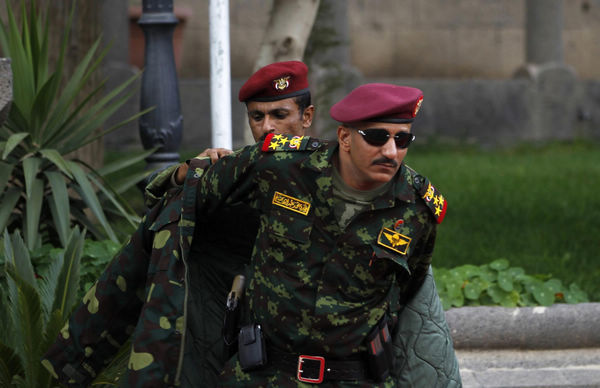Saleh's nephew quits Yemeni army
Updated: 2012-05-04 16:16
(Xinhua)
|
|||||||||||
 |
|
General Tariq Saleh, a nephew of former Yemeni leader Ali Abdullah Saleh, puts on his coat at the Republican Palace in Sanaa January 10, 2011. [Photo/Agencies] |
SANAA - A nephew of Yemen's ex-President Ali Abdullah Saleh resigned as commander of an elite army unit on Thursday, a UN envoy said here, as part of the reforms taking place in the army.
"I witnessed the command transfer at the 3rd Republican Guard Brigade from General Tariq Mohammed Abdullah Saleh, a nephew of former president Ali Abdullah Saleh, to Abdulrahman al-Halili, who was appointed by President Abd-Rabbu Mansour Hadi," UN envoy to Yemen Jamal Benomar told reporters in the capital Sanaa.
Tariq Saleh was appointed as commander of the 3rd Brigade two months ago. Before that, he had been chief of the presidential guard. His departure was part of Hadi's reforms in the army in response to the mass protests urging the dismissal of the former leader's relatives from senior positions in the security and army forces.
On April 6, Hadi issued a republican decree to replace about 20 military generals, including former air force commander General Mohammed Saleh al-Ahmar, a half brother of Ali Abdullah Saleh. Saleh al-Ahmar only accepted the decree three weeks later, after his followers threatened to shoot down civil planes, an act that led to a temporary shutdown of the airport in Sanaa.
Hadi, who was elected in February as consensus president for a two-year interim period, has vowed to launch more reforms in the army in order to end the divisions that threaten to split the impoverished Arab country.
Meanwhile, thousands of Yemeni protesters rallied Thursday in Sanaa and several provinces, calling for the removal of Saleh's son Ahmed Ali as chief of Yemen's elite Republican Guard. The protesters demanded Ahmed Ali's dismissal as the precondition for them to engage in the national dialogue aimed at ending the political tensions in the country.
Today's Top News
President Xi confident in recovery from quake
H7N9 update: 104 cases, 21 deaths
Telecom workers restore links
Coal mine blast kills 18 in Jilin
Intl scholarship puts China on the map
More bird flu patients discharged
Gold loses sheen, but still a safe bet
US 'turns blind eye to human rights'
Hot Topics
Lunar probe , China growth forecasts, Emission rules get tougher, China seen through 'colored lens', International board,
Editor's Picks

|

|

|

|

|

|





